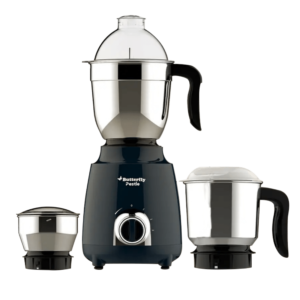Blender vs Juicer: What’s the Difference
What is the diffrence in blender and juicer When it comes to healthy living, one of the most common debates is blender vs juicer. Both appliances can process fruits and vegetables, but the end result is completely different. If you’re confused about which one to buy in 2025, this guide will help you with features, pros & cons, customer reviews, and a full comparison table.
Blender: Features & Real Experience
A blender grinds whole fruits and vegetables, including fiber, into a thick smoothie-like drink.
Key Features of Blenders
- Retains fiber and pulp from fruits and vegetables
- Great for making smoothies, shakes, soups, and nut butters
- Requires some liquid (water, juice, or milk) to blend hard items
- Versatile for both drinks and cooking needs
- Available in budget-friendly as well as premium models like NutriBullet or Vitamix
Real Customer Experience
One customer who switched from juicing to blending shared:
“I used to juice carrots every morning, but I noticed I was throwing away too much pulp. After buying a blender, I love that I’m getting all the fiber and the drink keeps me full longer. It feels like a complete meal rather than just juice.”
Pros of Blenders
- ✅ Retains fiber (good for digestion and satiety)
- ✅ Multipurpose (smoothies, soups, sauces, chutneys)
- ✅ Cheaper than high-end juicers
- ✅ Easier to clean (fewer parts)
Cons of Blenders
- ❌ Cannot make clear juices (like carrot juice)
- ❌ Texture may be too thick for some people

Juicer: Features & Real Experience
A juicer extracts juice by separating liquid from fiber. You get a smooth, pulp-free drink.
Key Features of Juicers
- Separates juice from fiber
- Produces nutrient-rich liquid (but with less fiber)
- Comes in centrifugal, cold press, and masticating types
- Ideal for carrots, beets, apples, and hard fruits
- More expensive than blenders, especially cold-press models
Real Customer Experience
Another buyer shared:
“I bought a second-hand juicer and loved having fresh juice daily. But I felt guilty seeing all the pulp wasted. Still, nothing can beat the smooth, refreshing juice I get from my juicer.”
Pros of Juicers
- ✅ Produces pulp-free, smooth juice
- ✅ Best for detox diets & juice fasting
- ✅ Extracts maximum liquid from fruits/vegetables
- ✅ Great for hard produce like carrots & beets
Cons of Juicers
- ❌ Discards fiber (less filling than smoothies)
- ❌ Good models are expensive

Blender vs Juicer: Quick Comparison Table
| Feature | Blender | Juicer |
|---|---|---|
| Output Texture | Thick smoothie with pulp | Smooth, pulp-free juice |
| Fiber Retention | ✅ Yes | ❌ No |
| Nutrient Absorption | Slower (due to fiber) | Faster (no fiber) |
| Fullness / Satiety | High | Low |
| Price Range | Budget to premium | Mid to high |
| Cleaning Effort | Easy | Moderate to hard |
| Best For | Smoothies, soups, whole nutrition | Juice fasting, detox, quick nutrient intake |
| Waste | None (uses whole fruit/veg) | Produces pulp waste |
Which One Should You Buy?
- ✅ Buy a Blender if you want full nutrition, fiber, and multipurpose use. Perfect for weight loss, meal replacement smoothies, and family use.
- ✅ Buy a Juicer if you prefer light, pulp-free juice and are focused on detox or medical diets. Best for those who don’t want thick drinks.
Which is the best Juicer Mixer Grinder in 2025
Tips for Buying a Blender or Juicer
- Wattage Matters – At least 500W for blenders, and 700W+ for juicers.
- Jar/Container Quality – Prefer stainless steel or BPA-free plastic.
- Ease of Cleaning – Juicers have more parts, so check if dishwasher-safe.
- Warranty & Service – Go for brands like Philips, Bajaj, Sujata, Kuvings, or NutriBullet with 2–5 years warranty.
- Your Goal – Smoothies & cooking → Blender. Juice detox → Juicer.
What is the Commision % Home loan Agents in 2025
FAQs
Q1. Which is healthier: juicer or blender?
➡ Both are healthy. Blenders retain fiber, juicers give concentrated nutrients.
Q2. Can a blender replace a juicer?
➡ For soft fruits, yes. But for hard fruits like carrots/beets, a juicer works better.
Q3. Is fiber loss in juicing a problem?
➡ Yes, fiber aids digestion and fullness. Juicing removes it.
Q4. Which is easier to clean?
➡ Blenders are simpler. Juicers have more detachable parts.
Q5. Which lasts longer: blender or juicer?
➡ With proper care, both last 5–7 years. Premium brands last longer.
Q6. Can I make smoothies in a juicer?
➡ No, juicers can’t handle fiber-rich smoothies. You’ll need a blender.
Q7. Are cold-press juicers worth it?
➡ Yes, they preserve more nutrients, but are costlier.
Final Verdict
Both blenders and juicers are useful kitchen tools with different purposes. If you want whole nutrition with fiber and versatility, a blender is the best choice. But if you prefer clear, refreshing juice for detox, go for a juicer.
Our Recommendation:
- For daily smoothies & multipurpose use → NutriBullet Blender or Sujata Dynamix
- For premium juicing → Kuvings Cold Press Juicer
Always choose based on your lifestyle, budget, and health goals.





